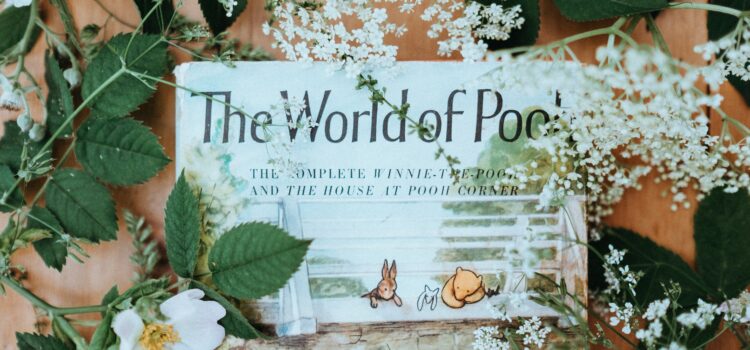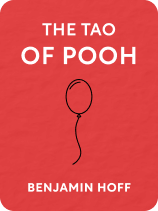

This article is an excerpt from the Shortform book guide to "The Tao of Pooh" by Benjamin Hoff. Shortform has the world's best summaries and analyses of books you should be reading.
Like this article? Sign up for a free trial here .
What is The Tao of Pooh by Benjamin Hoff? How does The Tao of Pooh book use the children’s characters to represent Taoism?
The Tao of Pooh by Benjamin Hoff is a book that uses Winnie-the-Pooh to explain Taoism. The Tao of Pooh book walks through the six principles of Taoism.
Read on for a summary of The Tao of Pooh by Benjamin Hoff.
The Tao of Pooh by Benjamin Hoff
The Tao of Pooh book uses the characters from the stories of Winnie the Pooh to exemplify the teachings of Taoism. Taoism is an ancient Chinese philosophy that focuses on the natural order of the universe as a guide for living, known as The Way. In Taoism, there are no preconceived notions about how life should be and no manipulation of the world to force it into what you want to happen. In the everyday world, people often use knowledge and cleverness to explain and justify behavior, rather than paying attention to the ebb and flow of the power that lives within everything. By giving your mind over to the power held within you and nature, you can find contentment and joy in simply living.
Six principles guide a Taoist life, and many elements from the stories of Pooh articulate the concepts held within them in The Tao of Pooh by Benjamin Hoff.
P’u—The Uncarved Block
The Taoist principle of P’u is translated into the image of the Uncarved Block, meaning that things in their original state carry their own natural power. When you manipulate that thing, or carve the block, you ruin its power.
Pooh is the embodiment of the Uncarved Block because he is simple-minded and doesn’t think too much about what life means or how to change the world to suit his desires. He simply exists in the world and takes life for what it is. The fact that Pooh is the hero of every story, not the other characters who do a great deal of thinking, such as Owl, Rabbit, and Eeyore, legitimizes his behavior.
The Cottleston Pie Principle in The Tao of Pooh by Benjamin Hoff
Cottleston Pie is a song sung by Pooh that expresses the principle of Inner Nature in Taoism. Inner Nature is the thing existing inside everything that makes it unique. The Cottleston Pie Principle has the following three doctrines:
1. Allow things to be what they are.
Everything and everyone has a purpose, and when that purpose is recognized and celebrated, things will happen as they are meant to happen. Ignoring Inner Nature is like trying to fit a square peg in a round hole. Life will be full of struggle and never turn out as it should.
For example, a gnarled tree will be difficult to turn into lumber. If you only see the value of the tree as a means for building something else, you will be disappointed. If you acknowledge that the unique shape of the tree makes it beautiful and the wide branches are good for shade, you will find value in the tree.
2. Everyone has limitations.
Limitations are only weaknesses if you want them to be. Everyone has things they are not traditionally made for or that they don’t like about themselves. But if you acknowledge them, you can understand how to use them to work for you. In contrast, ignoring your limitations puts your life and those around you in jeopardy.
For example, Tigger wanted to prove that tiggers can do anything, even climb trees better than bears. He climbed to the highest branch, but he was unable to come down. Pooh and the other characters had to risk their own safety to help Tigger get down from the tree.
3. Some things cannot be known.
People, especially scholars, have a hard time accepting that certain aspects of life or behavior have no explanations. When you seek to place a label or explanation on one of these things, you overshadow the Inner Nature at their core. If you can accept that certain things are just what they are, you will understand them better and find the proper use for them in the world.
The Way of Pooh
The Way of Pooh, or the Pooh Way, is the translation of the Taoist Wu Wei, which means following your Inner Nature and the rhythm of life. Wu Wei is akin to a lack of action, meaning you do not attempt to struggle or work against the natural flow of the universe.
Wu Wei is similar to water flowing down a stream. The water moves over or around the obstacles without resistance. When you live with Wu Wei, you are placing the round peg in the round hole. There are no mistakes because nature does not make mistakes.
For example, Pooh wanted to give Eeyore a pot of honey for his birthday, but on his way to Eeyore’s house, he ate the honey. Rather than panic, Pooh turned the empty pot into a present. Eeyore found the jar to be useful for storing things in and was delighted, even more than he would have been with a pot of honey.
The Antithesis of Wu Wei in The Tao of Pooh Book
In the world of Pooh, the Bisy Backson is someone who is always on the go, always searching for something better, and always trying to achieve more. They put forth these efforts to earn Big Rewards and Save Time. Science, business, and religion say that hard work leads to great rewards. But in their attempts to be the best, brightest, or righteous, the Bisy Backson never finds contentment because there will always be more just out of reach.
The problem with this type of life is that happiness and growth are sought through knowledge and cleverness. The Backson assumes happiness and growth will come from the outer world, instead of realizing they start inside. Additionally, all the efforts to save time simply waste time. There is joy to be found in the process of living. You need only to slow down and enjoy the power of life to find it.
The Tiddely Pom Principle
Everyone has something special about them, as does everything. When you approach yourself and others with caring and compassion, you are living with Tz’u, the Taoist expression that prioritizes the “heart” over the “mind.” The Tiddely Pom Principle is the act of taking the first step toward using our gifts effectively to be happy.
In layman’s terms, this idea is called the Snowball Effect—the first step you take toward opening your heart to your gifts and all the gifts in the world triggers the accumulation of more steps. Those steps lead to your ability to find wisdom, joy, and bravery in yourself simply by acknowledging their existence inside of you and being grateful for who you are and what you have.
The Empty Mind
When the mind is full of knowledge and cleverness, there is no room to simply see what is in front of you. The brain is diverted to focus on superfluous aspects of life. A full mind, therefore, leads you away from truth. An empty mind means seeking nothing and attempting to go nowhere. When the mind is clear, you can see things for what they are, marvel at them, and find the true spirit of their usefulness.
Your brain is capable of more than simply intaking, sorting, and regurgitating data. When the mind is clear, the avenues that lead to the brain’s higher powers are revealed. Creating a clear mind means going back to a childlike state, before our curiosity and openness to learning were diminished by knowledge and social conditioning. A childlike mind has been drained of the particulars of acquired knowledge and is free to follow the Way of the universe.
Taoism and Modern Society Using The Tao of Pooh by Benjamin Hoff
Humans have become separated from the reality of the natural world by knowledge and cleverness. Great minds have learned too much and thought their way into tunnels in which compassion does not reside. We seek happiness and stability through our clever thoughts and actions, but how happy or stable do any of us feel?
Those who will successfully find wisdom and happiness will be the ones capable of listening to their Inner Natures, being sensitive to the circumstances around them, and following the natural order of life using The Tao of Pooh by Benjamin Hoff. If you want to truly be wise and content, you must see the world through the inquisitive and objective mind of a child to find the right path to follow.

———End of Preview———
Like what you just read? Read the rest of the world's best book summary and analysis of Benjamin Hoff's "The Tao of Pooh" at Shortform .
Here's what you'll find in our full The Tao of Pooh summary :
- How Winnie-the-Pooh perfectly models the principles of Taoism
- The 6 principles of Taoism reflected in Pooh's adventures
- How to become Winnie-the-Pooh and unlock a magic inside of you






